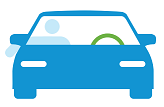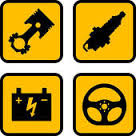 Dozens of well-known corporate brands are now developing and building their own Driverless vehicles.
Dozens of well-known corporate brands are now developing and building their own Driverless vehicles.
But how will the future look when the Driverless era is actually with us?
For every action there is a reaction and the Driverless revolution is no exception.
The implementation of Driverless Autonomous vehicles, will change if not positively rock many other establishments and industries that have been with us for Centuries.
The change might not necessarilly be bad or negative in every case, but the change will certainly happen.
The question is, just how much change?
Remember we are not just talking about the effects for one Country below, we are talking about the effects on the entire world.
The figures involved, in terms of People, Revenue, Jobs, are huge, almost incalculable.
Here are some thoughts on just 10 key areas that may be affected (there are certainly many, many more) :
1. The (Multi Billion) Insurance Industry
Everyone is agreed that Driverless Autonomous vehicles will make Car travel much safer, reducing accidents by as much as 85% to 90% according to experts. Will the amount of Insurance Company businesses therefore reduce by this high level?
Will Insurance Companies even be needed for the Auto theft side, as an Autonomous vehicle may just "refuse" to be operated or function in the wrong hands, due to its programming.
2. Auto Car Garage repair businesses
As above, in simple terms, less accidents mean less repairs. But there are more than 170,000 Auto Repair businesses in the USA alone, employing almost 700,000 people, mainly in Car repair. But, on the bright side, Driverless Cars will still need tyres, oil and servicing etc.
Or, will more Repair businesses also become vehicle dealers? That's a lot of dealers.
3. Auto parts
Driverless Vehicles will embrace ultra-efficient driving techniques, using smart modules and ground-breaking software. So this will all mean less Clutch, Brake pad, gearbox, engine wear and wear and tear in general. When coupled with the estimated 90% less accidents, that will also mean a dramatic change to the huge spares industry, estimated in 2013 to be worth 320 Billion USD, just in the USA alone.
The positive here is surely the huge reduction of the Worlds materials resource, but how will this affect us and by how much?
4. Hotels
Many of the low budget roadside hotel chains, you know the ones, gain a lot of passing trade from car drivers, business people, just needing an overnight break, because they are quite correctly too tired to continue driving. If driver fatigue was no longer the case, or put another way, the option was there to sleep whilst being driven during the night by an autonomous vehicle, then how many hotels would cease to exist? How many tens of thousands of rooms would no longer be needed Worldwide?
Or, would these Hotels and Motels become Driverless Hubs /Bases?
5. Truckers and Commercial drivers
There may be no requirement for professional drivers when the Driverless time comes in earnest.
Perhaps the lorry or truck will one day drive itself, but surely it will always need its one time driver, to oversee things at either end?
So a redeployment rather than a Job loss?
6. Airlines
According to the Bureau of Transportation Statistics (http://www.transtats.bts.gov/), more than 1.75 million passengers fly in the world every day on a domestic type flight. (in fact this data is a few years old, the actual figure is certain to be much higher than this) Some of these short haul flights, especially to adjoining state cities, would certainly be at risk from driverless ground travel. New York to Boston, Manchester to Birmingham, Munich to Berlin, Tokyo to Nagoya, and so on. The travel time to the airport and the lengthy security check in time at either end, will surely just make the stress free driverless land journey option a no brainer.
So there will be many who would say - why Fly?
Would the resulting, not insignificant, reduction of Aviation fuel in the world help the environment?
Maybe so, especially if the Driverless car taking the ground level journey option, could be propelled in other ways, rather than burning diesel or petrol
7. Taxis / Minicabs
Uber has long been a force to be reckoned with when it comes to paid transport. Now they are talking about operating their own fleets of Driverless Taxis.
Another company, Lyft, is working with GM to develop similar business models.
Apart from huge concern about the tens of thousands of Taxi Drivers facing extinction, would this also mean that the majority of actual Driverless vehicle ownership will ultimately be with these types of companies?
Will we ever need to own a car in the future, or will we just call one up on our Smart phone when we need collecting?
8. Buses and other public transport
Will we ever even need Driverless buses, when we have the Uber, Lyft and the other future emerging small abundant vehicle taxi/hailing solutions?
9. Car Parking / Garaging
In the USA alone there is over 60 Billion square feet of ground, dedicated entirely to parking cars upon.
That is about the same size as the entire state of Delaware...
But will we need as many car parks? Driverless vehicles will be constantly, efficiently running, with planned collection and drop off journeys, plus there will also be far fewer vehicles in total, due to a decreased ownership as discussed previously. Therefore there will be far less demand for acres of car parks and a huge freeing up of land for other, perhaps greener developments.
10. Fuel / Energy usage
There is a theory that Autonomous vehicles may actually use more energy than at present, either Petroleum based or Electric
This is a prediction largely based on the convenience factor of having "transport on tap" and it remains to be seen if it will be the case.
More importantly, it remains to be seen whether the Driverless manufacturers and Developers sieze this opportunity to not just change over to Driverless vehicles, but to completely overhaul and rethink the entire transportation question and the big picture. This would of course then involve completely moving away from fossil fuels from the outset, or at least at the earliest possible technologically enabled opportunity.
Every one of the above questions begs even more questions. But nobody really knows until it happens.
"Driverless" is a huge, huge subject, and will probably remain in mainstream development long after many of us are long gone.
<<< Back to the Driverless Blog
